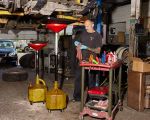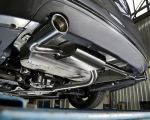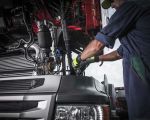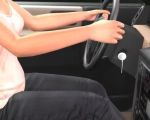Cabin Air Filter Replacement: Essential for Your Vehicle's Health
- 1. Importance of Cabin Air Filter Replacement
- 2. Symptoms of a Dirty Cabin Air Filter
- 3. How to Replace the Cabin Air Filter
- 4. Benefits of Replacing the Cabin Air Filter Regularly
- 5. Cost of Cabin Air Filter Replacement
- 6. When Should You Replace Your Cabin Air Filter?
1. Importance of Cabin Air Filter Replacement
The cabin air filter plays an essential role in maintaining the air quality inside your vehicle. This small yet crucial part filters out dust, debris, and harmful pollutants from the air that enters through the vents, keeping the air in your car fresh and breathable. Over time, however, the cabin air filter can become clogged, reducing its effectiveness and potentially leading to unpleasant odors or reduced airflow.
Ensuring that the cabin air filter is replaced regularly is not just important for comfort but also for your health and the overall performance of your vehicle. When the filter is dirty, the air inside the cabin can become stale, and pollutants like pollen and smoke may circulate, potentially aggravating allergies or respiratory conditions. In addition, a clogged air filter can strain the vehicle's HVAC system, leading to inefficient operation and higher energy consumption.
By understanding the importance of this small component, vehicle owners can take proactive measures to ensure that their car remains comfortable, healthy, and efficient to drive.
2. Symptoms of a Dirty Cabin Air Filter
There are several signs that indicate your cabin air filter needs replacement. One of the most noticeable symptoms is poor airflow from the air vents, even when the fan is set to high. A clogged filter restricts the airflow and reduces the effectiveness of your air conditioning and heating systems.
Another common symptom is unpleasant odors inside the vehicle. As the filter collects dust, pollen, and moisture, it can become a breeding ground for bacteria and mold. This leads to musty, stale smells circulating through the cabin, especially when the HVAC system is running.
If you notice increased dust inside your car or the air smells stale, these are also signs that the cabin air filter is due for a replacement. Finally, some modern vehicles have a warning light or alert for maintenance, which may signal the need to replace the cabin air filter.
3. How to Replace the Cabin Air Filter
Replacing the cabin air filter is a relatively simple task that you can do yourself if you're comfortable with basic car maintenance. First, locate the cabin air filter in your vehicle's manual. Typically, the filter is located behind the glove box or under the dashboard, although some cars may have it in the engine bay.
Once you've located the filter, remove the panel or cover that protects it. You may need to detach the glove box or a few screws to access the filter. Carefully remove the old filter, paying attention to the orientation of the filter so that you can install the new one correctly.
Install the new cabin air filter by sliding it into the same compartment, ensuring it fits snugly. Replace the cover or panel, and you're done. If you're unsure about doing it yourself, it's always a good idea to visit a professional mechanic for assistance.
4. Benefits of Replacing the Cabin Air Filter Regularly
Replacing the cabin air filter regularly offers numerous benefits. First, it ensures clean and fresh air inside your car, improving the comfort of everyone in the vehicle. Fresh air without allergens, dust, or pollutants can significantly improve your driving experience.
Secondly, a clean cabin air filter helps maintain the efficiency of your vehicle’s HVAC system. By reducing strain on the system, a new filter allows your air conditioning and heating to work more effectively, ensuring that your car stays at a comfortable temperature year-round.
Lastly, regularly replacing the cabin air filter can help you avoid more expensive repairs. A clogged filter can lead to overheating of the HVAC system, causing unnecessary wear and tear that could result in costly repairs down the line. By taking care of this small task, you prevent larger, more expensive issues from arising.
5. Cost of Cabin Air Filter Replacement
The cost of replacing a cabin air filter is relatively low compared to other car maintenance tasks. On average, cabin air filters range from $15 to $30, depending on the make and model of your vehicle. If you're having a mechanic replace it for you, the cost may increase due to labor charges, bringing the total to between $50 and $100 in most cases.
If you're looking to save money, replacing the cabin air filter yourself is a great option. With a small investment in a replacement filter, you can easily extend the life of your vehicle’s HVAC system and enjoy cleaner air without the added cost of professional service.
6. When Should You Replace Your Cabin Air Filter?
The general recommendation is to replace your cabin air filter every 12,000 to 15,000 miles or once a year, depending on your driving habits and the environment. If you frequently drive in dusty or polluted areas, you may need to replace the filter more often. Additionally, if you use your vehicle’s air conditioning or heating system regularly, the filter can become dirty more quickly.
Some vehicles may have a maintenance schedule or indicator that will alert you when it’s time to replace the cabin air filter. If you notice any of the symptoms mentioned earlier—such as poor airflow or unpleasant odors—it's a good idea to check the condition of the cabin air filter and replace it if necessary.
Taking care of your car’s cabin air filter is an essential part of regular vehicle maintenance. By understanding when and how to replace the filter, you can ensure that your car runs efficiently, keeps the air inside fresh, and avoids unnecessary repairs. Regular filter replacement not only makes your driving experience more comfortable but also helps protect your health and your vehicle’s longevity.
For more information on vehicle maintenance or to book professional towing services, visit Rescue & Towing today!




























